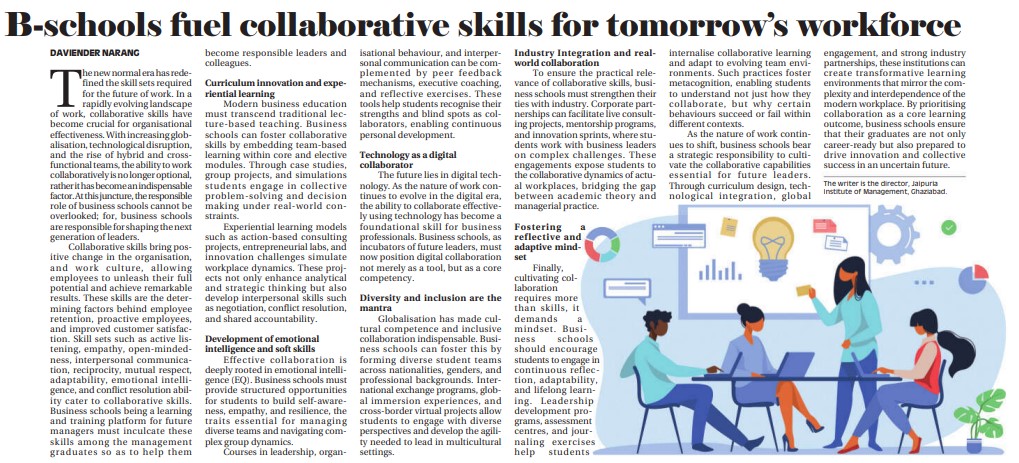The new normal era has redefined the skill sets required for the future of work. In a rapidly evolving landscape of work, collaborative skills have become crucial for organisational effectiveness. With increasing globalisation, technological disruption and the rise of hybrid and cross- cross-functional teams, the ability to work collaboratively is no longer optional, rather it has become an indispensable factor. At this juncture, the responsible role of business schools cannot be overlooked, for, business schools are responsible for shaping the next generation of leaders.
Collaborative skills bring positive change in the organisation, and work culture, allowing employees to unleash their full potential and achieve remarkable results. These skills are the deter mining factors behind employee retention, proactive employees, and improved customer satisfaction. Skill sets such as active listening, empathy, open-minded-ness, interpersonal communication, reciprocity, mutual respect, adaptability, emotional intelligence, and conflict resolution ability cater to collaborative skills Business schools being a learning and training platform for future managers must inculcate these skills among the management graduates so as to help them become responsible leaders and colleagues.
Curriculum innovation and experiential learning
Modern business education must transcend traditional lecture based teaching. Business schools can foster collaborative skills by embedding team-based learning within core and elective modules. Through case studies, group projects, and simulations students engage in collective problem-solving and decision making under real-world constraints.
Experiential learning models such as action-based consulting projects, entrepreneurial labs, and innovation challenges simulate workplace dynamics. These projects not only enhance analytical and strategic thinking but also develop interpersonal skills such as negotiation, conflict resolution, and shared accountability.
Development of emotional intelligence and soft skills
Effective collaboration is deeply rooted in emotional intelligence (EQ). Business schools must provide structured opportunities for students to build self-aware ness, empathy, and resilience, the traits essential for managing diverse teams and navigating complex group dynamics Courses in leadership, organisational behaviour, and interpersonal communication can be complemented by peer feedback executive coaching, and reflective exercises. These tools help students recognise their strengths and blind spots as collaborators, enabling continuous personal development.
Technology as a digital collaborator
The future lies in digital technology. As the nature of work continues to evolve in the digital era, the ability to collaborate effectively using technology has become a foundational skill for business professionals. Business schools, as incubators of future leaders, must now position digital collaboration not merely as a tool, but core competency.
Diversity and inclusion are the mantra
Globalisation has made cultural competence and inclusive collaboration indispensable. Business schools can foster this by forming diverse student teams across nationalities, genders, and professional backgrounds. International exchange programs, global immersion experiences, and cross-border virtual projects allow students to engage with diverse perspectives and develop the agility needed to lead in multicultural settings.
Industry Integration and real world collaboration
To ensure the practical relevance of collaborative skills, business schools must strengthen their ties with industry. Corporate partnerships can facilitate live consulting projects, mentorship programs, and innovation sprints, where students work with business leaders on complex challenges. These engagements expose students to the collaborative dynamics of actual workplaces, bridging the gap between academic theory and an managerial practice.
Fostering reflective and adaptive mind-set
Finally, cultivating collaboration requires more than skills, it demands a mindset. Business schools should encourage students to engage in continuous reflection, adaptability. and lifelong learning. Leadership development pro-grams, assessment centres, and journaling exercises help students internalise collaborative learning and adapt to evolving team environments. Such practices foster metacognition, enabling students to understand not just how they collaborate, but why certain behaviours succeed or fail within different contexts.
As the nature of work continues to shift, business schools bear a strategic responsibility to cultivate the collaborative capabilities essential for future leaders. Through curriculum design, technological integration, global engagement, and strong industry partnerships, these institutions can create transformative learning environments that mirror the complexity and interdependence of the modern workplace. By prioritising collaboration as a core learning outcome, business schools ensure that their graduates are not only career-ready but also prepared to drive innovation and collective success in an uncertain future.
The writer is the director, Jaipuria Institute of Management, Ghaziabad.
Published by The Statesman newspaper on 24th June 2025





